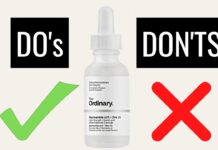Niacinamide serum has gained popularity in the skincare industry due to its numerous benefits and relatively low risk of side effects. Niacinamide, also known as vitamin B3 or nicotinamide, is a water-soluble vitamin that offers various advantages for the skin when applied topically. Niacinamide serum is formulated with a higher concentration of to deliver targeted skincare benefits effectively.

Niacinamide Serum Uses:
- Improves Skin Texture: Niacinamide has been shown to enhance the skin’s barrier function, resulting in improved hydration and a smoother texture. Regular use of niacinamide serum can help soften rough patches, minimize the appearance of fine lines, and even out skin tone.
- Reduces Hyperpigmentation: Niacinamide inhibits the transfer of melanin (pigment) within the skin, making it effective in reducing the appearance of dark spots, sun damage, and hyperpigmentation. Niacinamide serum can help achieve a more even and radiant complexion with consistent use.
- Minimizes Pores: Niacinamide regulates sebum production in the skin, which can help reduce the size and visibility of pores. By controlling oiliness and preventing pore congestion, niacinamide serum contributes to a smoother, more refined skin texture.
- Boosts Collagen Production: Niacinamide stimulates collagen synthesis, a protein crucial for maintaining skin elasticity and firmness. By promoting collagen production, niacinamide serum helps reduce the appearance of wrinkles, fine lines, and other signs of aging.
- Anti-Inflammatory Properties: Niacinamide exhibits anti-inflammatory properties that make it suitable for calming and soothing irritated or sensitive skin. Niacinamide serum can help alleviate redness, inflammation, and discomfort associated with conditions like acne, rosacea, or eczema.
Niacinamide Benefits:
- Versatility: Niacinamide serum is suitable for all skin types, including sensitive and acne-prone skin. It is well-tolerated and can be incorporated into various skincare routines to address multiple concerns simultaneously.
- Gentle Yet Effective: Unlike some other skincare ingredients, niacinamide is relatively gentle on the skin and rarely causes irritation or allergic reactions. This makes niacinamide serum suitable for daily use, even for individuals with sensitive skin.
- Compatible with Other Ingredients: Niacinamide can be easily integrated into existing skincare regimens and is compatible with a wide range of other skincare ingredients, including retinoids, vitamin C, and alpha hydroxy acids (AHAs).
- Long-Term Benefits: With consistent use, niacinamide serum can provide long-term improvements in skin texture, tone, and overall appearance. It offers cumulative benefits over time, making it a valuable addition to any skincare routine.
Niacinamide Side Effects:
- Rare Occurrence: Niacinamide is generally well-tolerated by most individuals and rarely causes side effects. However, some people may experience mild and temporary reactions, particularly when first introducing into their skincare routine.
- Potential for Irritation: In some cases, niacinamide serum may cause mild irritation or redness, especially if used in high concentrations or in combination with other active ingredients. It’s essential to patch-test the product before widespread use and to discontinue use if irritation occurs.
- Allergic Reactions: Although rare, some individuals may be allergic to niacinamide and experience allergic reactions such as itching, swelling, or rash. If allergic symptoms occur, discontinue use of niacinamide serum and consult a dermatologist for further guidance.
- Interaction with Other Products: Niacinamide is generally compatible with most skincare ingredients, but it’s essential to avoid using in combination with products containing acidic ingredients, such as vitamin C or AHAs, as this may reduce its efficacy.
- Sensitivity to Sunlight: Niacinamide may increase the skin’s sensitivity to sunlight, although to a lesser extent than some other skincare ingredients. It’s essential to use a broad-spectrum sunscreen with SPF 30 or higher during the day to protect the skin from UV damage.
In summary, offers a wide range of benefits for the skin, including improved texture, reduced hyperpigmentation, minimized pores, boosted collagen production, and anti-inflammatory effects. With its gentle yet effective formulation and minimal risk of side effects, is suitable for all skin types and can be incorporated into daily skincare routines to achieve healthier, more radiant-looking skin.







